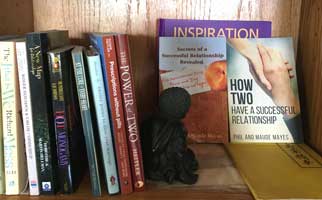Successful Relationship Reading Corner

In this week's blog, we wrote about how to be present in your life and relationship. Here are some interesting perspectives on presence.
Freedom Is Being Present "We live two lives: we live life in our thoughts and we live life as our experience of the present moment. Freedom comes as our life in thoughts diminishes and our experience of the present moment predominates. Freedom comes through learning how to balance thoughts and the present moment. We developed the ability to think abstractly only about 70,000 - 95,000 years ago. Apparently the part of life we live 'in our head' today simply did not exist before that time, and instead human life was solely a series of immediate experiences, like the lives of other creatures."
Mindfulness in relationships "For many of us our ideas of love and relationships are formed from a young age, what we observe in our environment; namely our parents or guardians, to when we mature and begin to read novels and catch a glimpse of The Notebook. We see people around us talk about their feelings, emotions, hope and dreams and we start to dream that maybe some day we too might experience something similar. Our ideas mix with our delusions and get stirred by our beliefs to concoct a recipe of an ideal relationship with an ideal partner. An idea many of us again, rarely shake."
How Mindfulness Can Save Your Relationship "Mindfulness practice doesn’t just enhance our individual well-being. In fact, it’s now being shown to have a positive impact on interpersonal relationships. A 2004 University of North Carolina study of 'relative happy, nondistressed couples' showed that couples who practiced mindfulness saw improvements to their 'relationship happiness.' In addition, they experienced healthier levels of 'relationship stress, stress coping efficacy, and overall stress.'"
|